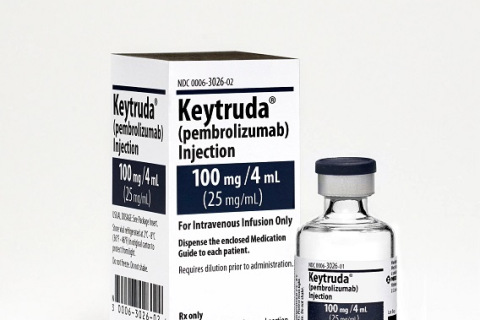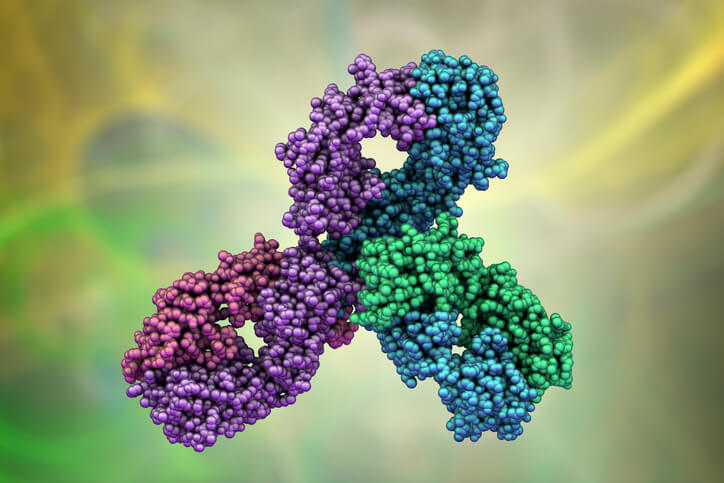
Pembrolizumab (Keytruda) for Mesothelioma
The FDA in September 2024 approved Keytruda (pembrolizumab) combined with chemotherapy as a first-line treatment for pleural mesothelioma. Research shows Keytruda can extend survival for certain mesothelioma patients.

What Is Keytruda (Pembrolizumab)?
Keytruda is an immunotherapy drug used to treat pleural mesothelioma. Combining it with chemo drugs helps mesothelioma patients who can’t undergo surgery.
The FDA approved it on Sept. 17, 2024, as a first-line treatment for mesothelioma based on Phase 2 and 3 results from the KEYNOTE-483 trial. It is most effective when tumors do not respond to or return after treatment.
Patients lived an average of 17.3 months in the KEYNOTE trial. This is an improvement from the typical survival time of about 12 months. Ongoing trials worldwide continue exploring Keytruda for mesothelioma. Researchers often combine it with surgery or chemo.
Keytruda Information
Keytruda is an injectable drug and a checkpoint inhibitor in immunotherapy. Treatments last about 30 minutes and occur every three weeks.
| Keytruda (Pembrolizumab) Information | |
|---|---|
| Name | Keytruda |
| Alternate Names | Pembrolizumab |
| Manufacturer | Merck |
| Dosage | 2 mg/kg every three weeks |
| Medical Code | J9271, C9027 |
| Active Ingredient | Pembrolizumab |
| Drug Class | Monoclonal antibody |
| Medical Studies | Pembrolizumab in Treating Patients with Malignant Mesothelioma |
| FDA Warning | Pneumonitis, colitis, hepatitis, hormone gland problems, kidney problems, anemia, skin rash, muscle or joint pain, muscle weakness, changes in eyesight |
For adults with TMB-H tumors, the recommended Keytruda dose is 200 mg every 3 weeks or 400 mg every 6 weeks. Dosage for mesothelioma patients may vary. Doctors determine the right dose and treatment duration.

Get specialized treatment from experienced mesothelioma doctors.
Find a Doctor NowHow Does Keytruda Work to Treat Mesothelioma?
Keytruda treats mesothelioma by boosting the body’s defenses against cancer. It blocks the PD-1 pathway, aiding the immune system in fighting mesothelioma. This differs from chemotherapy, which kills cancer cells without involving the immune system.
Keytruda stops PD-1 from interacting with PD-L1, allowing immune cells to attack mesothelioma. About 50% of mesothelioma cells express PD-L1. It helps them hide from the immune system. This is why Keytruda is effective for some patients.
Mesothelioma survivor Barbara Lapalla was diagnosed with pleural mesothelioma in 2018. Chemotherapy failed her because it didn’t stop mesothelioma from spreading. Surgery was not an option because of her age. The cancer had also started to spread into her abdomen.
Facing such a dim prognosis, her doctors decided to try Keytruda on her. Now, Barbara credits the immunotherapy drug for her turnaround. “I tell people today, I’m a walking miracle,” she said. “They don’t believe in miracles. Then they see me.”
Other mesothelioma survivors, including Walter Merth from Philadelphia and Randy Boudreaux from Mississippi, took Keytruda and had amazing results.
It seems to work well in certain cases. We still don’t have enough data to say for sure, but yes, [Keytruda] could become the next big thing for mesothelioma.
Side Effects of Keytruda
Keytruda side effects in mesothelioma patients include diarrhea, anemia and fatigue. The drug can trigger the immune system to attack healthy organs and tissues. This reaction can lead to severe side effects. These side effects are usually less severe than those from chemotherapy.
Common Side Effects
- Anemia (low red blood cell count)
- Constipation
- Cough
- Diarrhea
- Dry mouth
- Fatigue
- Itching
- Loss of appetite
- Nausea
- Pain in muscles, bones or joints
- Rashes
- Shortness of breath
Patients in a trial at Penn Medicine reported dry mouth, fatigue, nausea and loss of appetite. No one had to stop treatment because of side effects. In the Phase 2 KEYNOTE-158 trial, 69% of participants experienced side effects. Serious side effects occurred in 12% of patients.
Serious Side Effects of Keytruda
Keytruda rarely causes severe immune reactions in mesothelioma patients. Rare side effects impact the lungs, liver, kidneys and hormone glands.
Potential Serious Adverse Reactions
- Colitis
- Hepatitis
- Hormone gland problems
- Kidney problems
- Pneumonia
Hormone gland issues may develop. These issues include hair loss, muscle aches, rapid heartbeat, headaches and weight loss. Kidney problems can involve inflammation or failure.
Some patients may have reactions to the IV infusion. Reactions include chills, dizziness, fever, itching, rash, shortness of breath or wheezing. Patients must report these symptoms to their doctors.

In this free recording, learn how this latest FDA-approved combination therapy offers new hope to patients.
Get a RecordingEligibility for Keytruda
Mesothelioma patients with inoperable or recurring cancer are eligible for Keytruda. Those with high PD-L1 levels will have a better response. PD-L1 levels are high in 20% to 40% of pleural mesothelioma patients.
Keytruda is available as a first- and second-line treatment for advanced mesothelioma. It’s also accessible through clinical trials with varying criteria.
Standard first-line treatment for early-stage mesothelioma involves surgery, chemotherapy and radiation. Its long-term effectiveness is limited. Immunotherapy can help control the cancer when it returns.
Encouraging Results from KEYNOTE-483 Trial
The trial showed that Keytruda and chemotherapy improved survival compared to chemo alone. Survival was 17.3 months with Keytruda and 16.1 months with chemo alone.
The response rate jumped from 29% with chemo to 52% when adding Keytruda. Adverse reactions were similar between the two groups. The increased effectiveness did not cause worse reactions.
This therapy has given me a new window. It may not save my life, but it’s certainly buying me some valuable time.
The FDA approved Keytruda as a second-line therapy in 2020 for mesothelioma patients with high tumor mutation burden. It had earlier approvals for melanoma, colorectal and lung cancers. Doctors believe it will improve long-term mesothelioma management.
Recommended Reading





